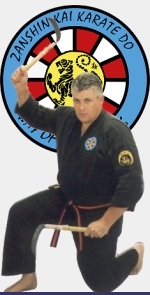 |
Finance - Self Help - Motivation - Self Defense - Personal Growth Self help books, personal growth, financial growth & motivational products to help you achieve financial freedom, increase motivation and improve your self esteem. |
 |
|
|
The Official Website of Kyoshi Gary Simpson
|
Zen Garden > What the Samurai Can Teach Us About Self-ImprovementThe samurai lived by the sword and died by it. They were so adept at reading body movement that they were able to draw their swords and use them with deadly effect against opponents in the mere blink of an eye.
So how can the code that they lived their lives by in the Seventeenth Century help you now?
"A man who has attained mastery of an art reveals it in his every action" This saying is one of my personal favorites. There is so much depth to its meaning. Allow me to discuss it a little and explain how it will be able to benefit you. First, a question: What is the single greatest thing that you can do with mastery and excellence? Don't say: "nothing." Everybody is good at something. Just think for a moment. There will be one thing that you can do perfectly time and time again. It is the thing that is so ridiculously easy for you to do that you can do it with your eyes closed, almost standing on your head - so to speak. It may be a simple thing or it may be something quite complex, but whatever it is you make it look easy. In fact, you are so good at it you make other people think that they can do it easily too - until they try. It might be a sport like tennis or something as mundane as making scones or cupcakes. It's amazing how a champion tennis player can make the game look so simple. Or how a master cook can seemingly slap ingredients together and come up with an absolute masterpiece of culinary delight. So what is it? What are you a master at? Keep that thing in mind while I diverge back to the samurai for a moment - a little bit of history. The samurai lived by the sword and died by it. They were so adept at reading body movement that they were able to draw their swords and use them with deadly effect against opponents in the mere blink of an eye. Their observations and reflexes were finely honed, principally because their very existence depended on it. But did you know that they were able to transcend their ability with the sword into other arts? Many of them were also master poets. Others were highly skilled calligraphers. Others became very skilled in the art of the tea ceremony. Some became master carpenters. Have you noticed how these "ancillary" skills are so diametrically opposed to their military expertise with the sword? So how and why did they engage in these things? Could it be that they were "balancing" their lives? Were they following the concept of "yin and yang?" If you are not sure what yin and yang is I will outline it briefly for you. Basically, it a Japanese recognition of the duality of all things in nature. For instance, night and day, female and male, black and white and so on. Further, there is some night within day and some day within night and so on. Time for another question. Are you so set in your ways that you refuse to develop other skills? Can you not broaden your horizons? Might you be able to "balance" your life a little more? Think back to that one thing that you are able to do very well. Why not take that mindset and transfer it to something else? You can create a persona that shows other people that you are a special person. Others have done it. You even know them. Some of them might even be your close friends. They are the people who seem to be good at everything they turn their minds to. I'll bet you are thinking of somebody like that right now. Now you know how they do it. They are using the samurai maxim. And just to balance the genders (yin and yang): "A woman who has attained mastery of an art reveals it in her every action" Develop yourself. Improve your abilities. You can do it. All it takes is discipline and a willingness to expand your mind. The samurai did it. So can you.
|
|
|
| web site design by Linda Caroll |
All Rights Reserved under International Copyright Conventions |
web hosting by Bengal Marketing |
